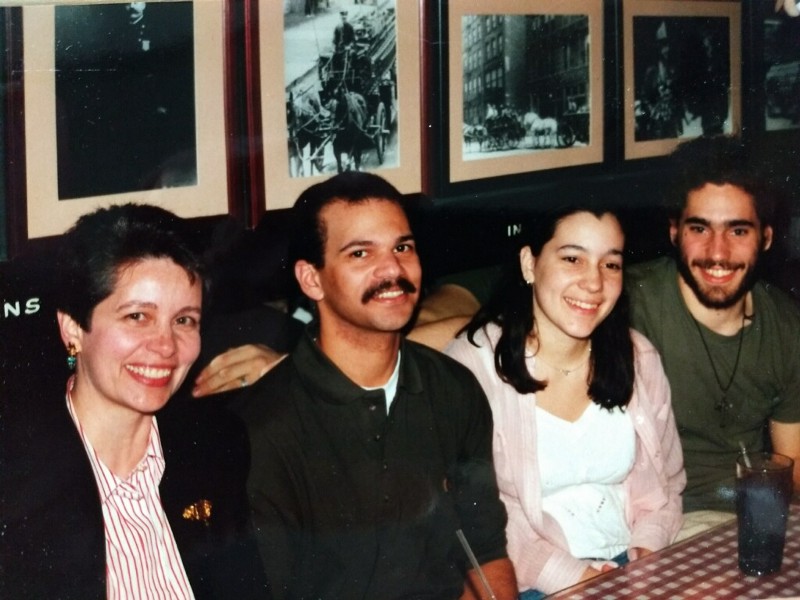Separating Families Is the Real Crime, by Christina Mansfield

My mother Roberta surrendered her first-born child Josh for adoption in 1970. Every person with authority in her life convinced her that she could not have a child out of wedlock. They told her that she couldn’t raise a child alone and that her son would be better off without her.
She rarely disclosed to anyone that the father of her child was an African American man. My mother describes the racist climate of her small New England town: “You cannot imagine it, how people would look at us with such hatred in their eyes.”
Roberta felt trapped. She had been raised Catholic and she had sinned. Society, as she experienced it, would not tolerate her immorality. “You have to remember,” she said, “it was a different time. It was unthinkable to go home with a baby if you weren’t married. It was a great shame.”
As recent immigrants, my grandparents were particularly concerned with how others in the community perceived them. They wanted to be accepted. They decided to send Roberta to a home for unwed mothers where she stayed with 20 other unmarried and pregnant girls and young women. She stayed in this institution for months and carried her baby, alone. She then gave birth to him, alone.
My mother was reunited with her son, Josh, when I was 16 years old. This was transformative for both of them and my mother turned into someone I barely knew; she was happy. The burden she had endured all of those years was lessened somewhat and her personality transformed. I could suddenly understand the source of my mother’s sadness throughout my childhood, which had a deep impact on me and our family.
Within a day of learning about Josh, I met him. He had grown up 20 minutes away. He was adopted by an affluent white family in an area with very few African American people. He was the only adopted child in a family with three children. Though his family was loving, he felt different and he suffered.
After meeting Josh, I began to study the way that racism, assimilation, and the immigrant experience all interact with each other in American culture. I wanted to understand how this happened to my family and why.
I thought about the way my mother was shamed into making the decision to surrender her child. And then this child, my brother, felt shame because of his abandonment and his difference. Why was their separation deemed necessary in order to lessen shame?
Their separation was punishment dressed up as protection and it was systemic.
Between 1945 and 1973, 1.5 million unmarried young American women were pressured into surrendering their children for adoption. Society was steeped in white supremacy and a misguided form of Christian morality. Today, the status quo is still carefully maintained by not allowing different ways of life rooted in equity and justice to flourish.
Recently, the U.S. government increased the practice of separating migrant parents and children at the Southern border. Attorney General Jeff Sessions declared the administration would enforce laws to criminally prosecute all migrants at a rate like never before. Parents are being criminally prosecuted for “illegal entry,” while their children are being placed in the custody of the Office for Refugee Resettlement. Those who witness these traumatic separations attest to the terror they inflict. The Trump administration admits that it is pursuing this cruel policy in order to deter future migrants.
I was drawn to my life’s work because of the separation of my mother and brother and my inheritance of their loss. I co-founded Freedom for Immigrants and we advocate for the abolition of the United States’ profit-driven immigration detention system. We understand that the mass incarceration of African Americans, and increasingly immigrants, is no coincidence. And neither is the current separation of families along the border.
The separation of families along the border is a strategy to maintain white supremacy and it is a continued part of our legacy of slavery. Families were routinely bought and sold, cruelly torn apart from one another on the auction block. The threat of separation was constantly wielded as a weapon to protect the regime of slavery and keep people from exercising resistance to it. And when abolitionists argued that the human suffering caused by slavery could not be justified, those who wanted to preserve the status quo argued that they were required to enforce the law, however unethical.
Many of our immigration laws today are directly descended from antebellum laws that aimed to curtail the migration of free black people. Many free black people were denied the ability to migrate freely within the country because their freedom represented a threat to the continued control of those who remained enslaved. They were routinely banned from communities and entire states. When they were allowed entrance to certain communities, they were required to post a monetary bond to ensure they would not become a public charge on the community.
In contemporary immigration law the concept of “public charge” and the requirement of migrants to post a monetary bond to ensure they will not become a burden remains central to the immigration detention system. Immigration judges assign a bond to a person in immigration detention when they determine that the person is not a danger to society. In fact, thousands of people languish in immigration detention simply because they cannot afford to pay this bond, simply because they are poor.
In reflecting on the separation of my mother and brother, I think about the way Josh’s ancestors were likely bought and sold and torn apart from each other. But he was cut off from this history. Entire generations of people were separated from one another. And history keeps repeating itself because we lack collective memory with which to fight back.
Today, migrant parents may become permanently and legally separated from their children as a result of the enforcement of immigration laws. And their children are likely to be institutionalized and fostered or adopted by American families, losing a sense of their culture and identity that may be difficult to recover.
One thing is certain, these families, like my own, will never be the same. We were lucky to be able to reconnect with Josh, but this won’t be the case for many immigrant families. Generations of people will be deeply affected. The Administration’s goal is to cause this pain in order to deter others fleeing violence in their home countries from seeking asylum in the U.S.
I am heartened by the outpouring of voices in dissent of the policy of separating parents from their children. The Conference of Catholic Bishops condemned the practice this past week at an annual meeting. The Church, whose people had condemned my mother for having a child out of wedlock, is calling this modern form of familial separation immoral. Meanwhile, Attorney General Jeff Sessions quotes scripture to justify it.
We do not need to make immigration “illegal” and respond to humanitarian crises with punishment and strategies of deterrence. We need to stop the practice of separating immigrant families before it is too late. We also have to end the practice of incarcerating parents and children, whether together or separately, simply because they have violated immigration laws. It is entirely unnecessary.
Separating families is the real crime and it is our shameful American legacy.

